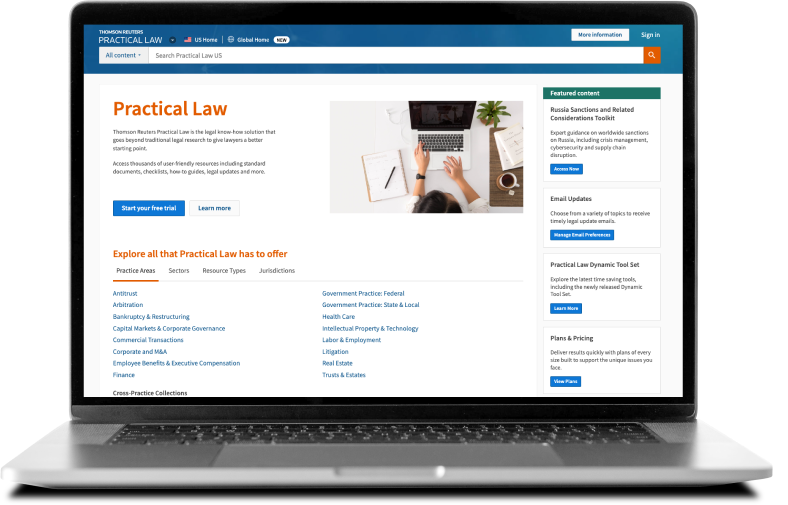Tools and tips for boosting the effectiveness of your use of time and resources when every day demands more
Jump to:
Growing businesses have diverse legal needs, just like their larger peers. On any given day, a general counsel (GC) at a growing business is balancing multiple, complex duties while helping business stakeholders incorporate risk awareness into strategic decision-making. In addition, GCs work hard to keep pace with marketplace, legal, and regulatory developments, either as the sole in-house lawyer or while managing a small team. As a GC, you know there simply isn’t time enough in your day to accomplish what you need to do — or enough budget to outsource multiple responsibilities.
The good news is that you don’t have to just work harder — you can work smarter. This guide provides you with eight proven strategies to help you and your team manage growing legal workloads more effectively and efficiently.

Strategy #1: Position your expertise
Working as a GC at a growing business or startup can be exciting. Instead of having a specifically-defined role and working years to prove yourself at a large company, you’ll provide leadership from Day One.
In the early days of your role, it’s important to:
- Meet all key stakeholders. Schedule introductory meetings with members of the C-suite, any heads of key functions, and partners. Learn about their business and legal needs and brainstorm possible solutions.
- Clarify roles and responsibilities. If you’re fortunate enough to have a legal team or external law firm support you, clearly specify which lawyers will handle which responsibilities — and communicate that to your stakeholders.
- Quantify and communicate your team’s value. Legal teams can be viewed as a cost centre and inhibitor of business momentum unless you change the conversation by driving economic value back to your organisation. For example use metrics to measure law department performance or harness the power of e-billing systems and other technology solutions to highlight the value of your legal department. That data can help you to justify headcount and get the resources you need when you’re planning and budgeting for the next financial year.

Strategy #2: Build productive working relationships
As a GC to a growing business or startup, you probably have more face time with leaders and partners than you would at a larger firm. That’s a great opportunity if you manage it well. It can help you fast-track your progress and solidify your position as a trusted advisor as you build and strengthen key relationships.
The offers a proven framework for building the full set of skills you need to be successful in your role. In addition to knowing the law and developing business acumen, like understanding , you need to burnish personal effectiveness skills, including:
- Building emotional intelligence. We’ve all heard the phrase “read the room.” Know what your peers think and feel, how you’re communicating and being perceived, and how cultural and personal attitudes and mores are changing.
- Cultivating external connections. Build strong relationships with individuals outside your firm, including your clients, your external legal advisers, GCs at other firms and other partners. Being able to have cordial conversations can improve mutually beneficial co-operation and collaboration and even diffuse contentious situations.
- Getting to know your colleagues. Set up social gatherings that don’t have any agenda but fun. Getting to know those you work with inside your own company can be rewarding both personally and professionally. Build strong relationships that will stand the test of time and weather the inevitable challenges and crises that every business experiences at some point.

Strategy #3: Develop business skills aligned to a proven model
Marketplace change is making the practice of corporate law more challenging. Fortunately, the Delta Lawyer Competency Model also provides guidance on which skills to develop and hone.
These skills include:
- Demonstrating business fundamentals. In a survey of in-house counsel, . Skills to develop include monitoring industry and regulatory change, educating stakeholders on relevant trends, and speaking in value-based language instead of legalese, among others.
- Improving project management. Legal duties are too important to administer via ad hoc processes or last-minute heroics. In-house lawyers are developing policies and procedures, documenting processes, implementing templates, proposing new solutions, and outsourcing or delegating repetitive tasks, among other duties.
- Adopting new technology. Depending upon your organisation’s size and budget, you may want to implement tools such as online legal research, legal drafting and e-discovery, editable templates and automated documents, legal practice management, and more.
- Developing data analytics. One way you can help prove the worth of your law department is by . This article on , discusses how to leverage data to add value to the business. However, if you’re not ready for this deep dive, go for some quick wins developing metrics around opened and closed matters, invoice reduction, or deal speed and redline turn time.
To help ensure that in-house lawyers grow in these 21st Century skills, implement the Delta Model at performance review time. Watch this role-play video to see how it’s done.

Strategy #4: Align around your organisation’s risk tolerance
Your business stakeholders know it’s important to manage risk, but they need help translating that into strategy and day-to-day operations. Consider implementing these:
- Determine your organisation’s risk tolerance. If your organisation has well-defined risk management processes, you’re in luck. If not, you should work with the executive team to establish them. That way, you can frame strategic decisions, risk analyses, and legal advice against your commonly agreed-upon risk tolerance for the organisation.
- Develop a holistic approach to risk management. Your organisation’s risk tolerance will change over time, as the business grows. Take a holistic view that’s guided by your organisation’s business strategy, with room for differences across business units and regions. For example, one way to conduct effective risk assessments is to consult two to three external lawyers with varying tolerances on “grey areas.”
- Document your processes. Avoid misunderstandings – or even worse, catastrophes – by documenting your risk-assessment protocols (like stations set up risk management pages with easy-to-access collateral and forms for ongoing reference.
- Create a risk-management culture. Many risks are caused by human error. Thus, everyone in your organisation should help manage risk every day. Create an effective risk-management culture by engaging in ongoing dialogue, training staff on policies and procedures, sharing real-life examples that make the need for risk management clear, and adopting technology to reduce manual processes that could cause errors.

Strategy #5: Work more effectively with easy-to-access forms
If you’re a GC to a startup or small business that’s growing fast, the workload can seem overwhelming. You’ll want to minimise mundane work, such as time spent finding or managing forms and templates so that you can focus on growing your knowledge and responsibilities.
When faced with a specific area of law or a task that is new to them, many GCs turn to the internet for knowledge.
Now, instead of searching madly online for the latest documents, you can access the Startup Company Toolkit from . Simply search or scroll to find links to all the documents you need, while making sure members of your team are all using the same forms.

Strategy #6: Offload or outsource non-core responsibilities
As the legal expert for your organisation, you’ll likely to be barraged with ongoing requests to offer your expertise. It’s up to you to protect your time, focus on C-suite and business imperatives, and triage or even turn down requests. As a solo GC you often end up being the commercial lawyer, the privacy lawyer, the corporate lawyer, the litigator, the paralegal, the employment lawyer — everything.
Here are some strategies for stretching your time and talent:
- Outsource responsibilities. You may not be able to afford a top-tier law firm, but consider buying time from a small boutique law firm or sole practitioner. If that’s not an option, perhaps you can hire a paralegal or get a law student intern to pitch in on key duties. In either case, having expert legal guidance l
- Train an inside resource. If you have an assistant or help from other business units, such as sales or marketing, maximise that help. Set up standardised processes so that your colleagues can gather information for contracts or complete other tasks.
- Learn when to say no. You’ll want to focus on responsibilities that are either urgent or that add value — or both. Set expectations with your stakeholders or win C-suite approval to drop non-core responsibilities or gain extra budget to hire support.

Strategy #7: Maximise available resources to solve problems
There is a wealth of legal resources available online to help you access key forms, learn, and solve problems. If you’re like most lawyers, you’ll devote hours a day to research, staying up to date on legal and other issues. You can use Westlaw to research your legal arguments, visit government websites for regulatory rules and human resources requirements, and conduct general internet searches for new rules and regulations.
Many GCs find it helpful to get everything they need in one place. A subscription service such as can provide you with fast, comprehensive access to the research, forms, checklists, and sample policies you need to run your legal department, saving you valuable time and simplifying the process of training new staff.

Strategy #8: Gain insights and strategies from your peers
As a GC, it can seem that you’re managing a never-ending, ever-changing workload, and it’s true. That’s why it helps to get advice from those in the trenches with you. Seasoned pros have seen it all before and can mentor you, while colleagues can lend a helpful hand.
- Build a network. Join or create a local organisation of GCs. Even better, set up a special interest group for GCs of businesses your size. Use these groups to share ideas, resources, and best practices, as well as to scout new talent.
- Read case studies. Organisations such as Thomson Reuters provide in-depth case studies of how GCs have navigated business change, built their teams, and overcome significant challenges.
- Learn from leaders. While the focus of large corporate law departments may not match 1:1 with your workday reality, these departments can provide invaluable insights. to gain clarity into GCs’ priorities, strategies for improving effectiveness and efficiency, and top tools.
________________________________________________________________________
As a GC of a growing business, you can have a significant effect on your organisation’s success — as well as safeguard its well-being. While your job will never be easy, online resources such as Thomson Reuters® Practical Law provide you with insights, forms, and tools so you can work effectively and efficiently.
Practical Law
Get up to speed and practice efficiently




